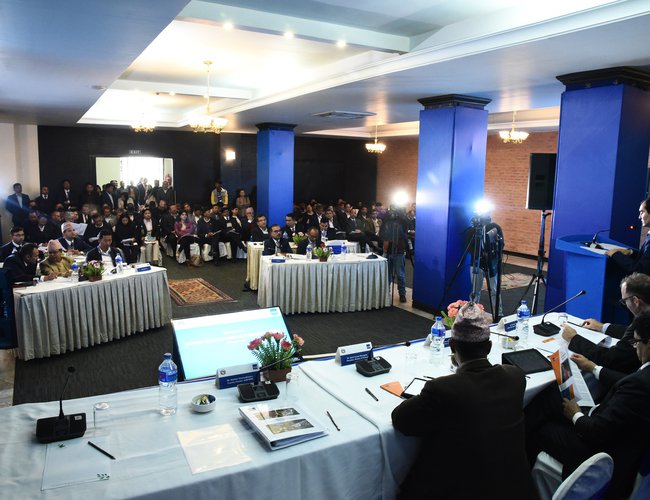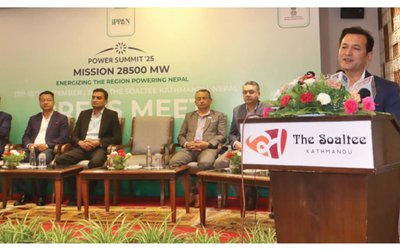
ADB’s portfolio in Nepal is growing. Since ADB began its operation in Nepal in 1969, its cumulative assistance stands at $6.2 billion, and as of end 2019, the active net portfolio stands at around $2.9 billion for 31 investment projects. Our major support (about 73% of the overall portfolio) is focused on the infrastructure sectors, including water supply and other urban infrastructure, energy, and transport. The remaining share of the portfolio is allocated to agriculture, natural resources and rural development; education including earthquake reconstruction; and finance. Last year ADB committed $388 million ($358 million for sovereign loans and $30.0 million for a non-sovereign loan). We expect to commit more in 2020.
The first portfolio review meeting of the year is important since it provides us opportunity to look back at the previous year’s achievements and issues. We can assess the progress made and discuss gaps in project implementation.Also, we can agree on targets for the new year. And finally, we can discuss and agree on project-specific actions for the short-term and on generic actions for the medium term to improve project performance and to achieve the planned annual targets.
The last year’s performance shows a mixed picture. On the positive side, for the first time Nepal’s disbursement exceeded a critical threshold of $300 million, reaching $323.7 million in 2019. While this is a great achievement as a result ofour joint efforts, the disbursement ratio of the Nepal portfolio did not improve and, in fact, decreased due to the new loan commitments added to the portfolio in 2019. In terms of disbursement ratio, Nepal’s portfolio islagging behind most other countries in South Asia. The disbursement needs to substantially increase to be close to $400 million per year for ADB to consider further increasing or even maintaining ADB’s commitment level. At the moment, 61% of the total portfolio remains undisbursed, which is very high.
Unfortunately, our achievements in contract awards were poor in 2019. For varies reasons, we were able to award contracts only for $256 million against a projected target of $381 million. This achievement is the lowest since 2015, the year of the earthquake. For projects to deliver results, contracts need to be awarded in time. I encourage all of us to work jointly to do much better in terms of contract awards in 2020.
What can we do to improve our portfolio performance?
On my view, there are 5 major issues that we need to address.
The first step is strengthening our teamwork. Close and regular coordination and communication, and timely decision making by ADB, the project teams, line ministries and the Ministry of Finance is essential.
The second step is ensuring sufficient human resources: It is very important that we have sufficient and efficient staff allocation to implement projects. We appreciate the establishment of dedicated project implementation departments and units, as these support efficient use of capacity. However, we see that while more and larger projects are approved, the number of staff with required knowledge and capacity is not increasing. The existing project people in executing and implementing agencies are spread too thin. We really see the need to employ more qualified staff, both technical and for safeguards and GESI. This is particularly important to address the growing portfolio in key infrastructure projects, especially in the roads and energy sectors.
The third issue is inter-agency coordination: We note a lot of time taken for decision-making, which involves several agencies. This causes serious implementation delays.We note that tree cutting permits, land acquisition and resettlement, stakeholder consultation and grievance settlement, utility-shifting, andsettlement of third-party damages are issues that do not get resolved in time and in a systematic manner, and, as a result, quite often require an ad-hoc solution. We request the government to pay specific attention to that. We are ready to support the government in developing more holistic and streamlined processes and systems for inter-agency coordination.
The fourth issue is timely reporting: We also see the need to improve performance in timeliness of submission of agreed reports, such as Audited Project Financial Statements, Quarterly Progress Reports, and Social and Safeguard Monitoring Reports. Apart from being bad practice and non-compliance with signed legal agreements, delays in submission of these reports are also affecting the overall rating the Nepal portfolio receives. This rating is one of the criteria for the country performance-based allocation of resources by ADB and directly impacts funds available for the country.
The last, but not least, issue is continuous capacity enhancement: To further strengthen the capacity of staff of executing and implementing agencies, ADB and the Ministry of Finance will continue to provide essentialtraining through the Capacity Development Resource Center. This will complement the capacity development provided by the consultants supporting individual projects. We plan to extend this training not only to project staff of central agencies, but also extensively to staff of sub-national governments that would be more involved in ADB-financed projects in the near future.
Mukhtor Khamudkhanov is the Country Director, ADB Nepal Resident Mission. Excerpts of his statement delivered at 2020 Country Portfolio Review Meeting on 17 February 2020.
















